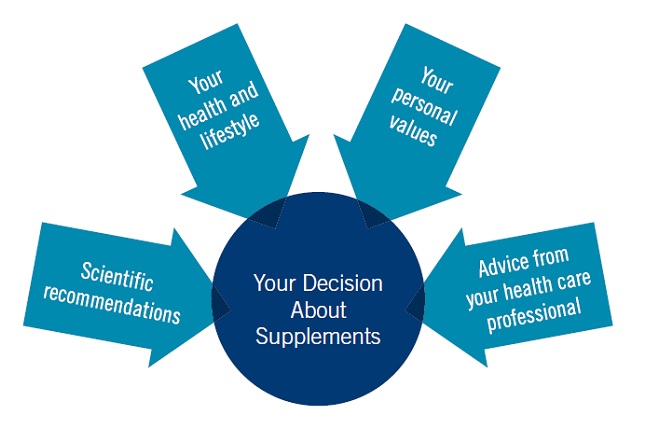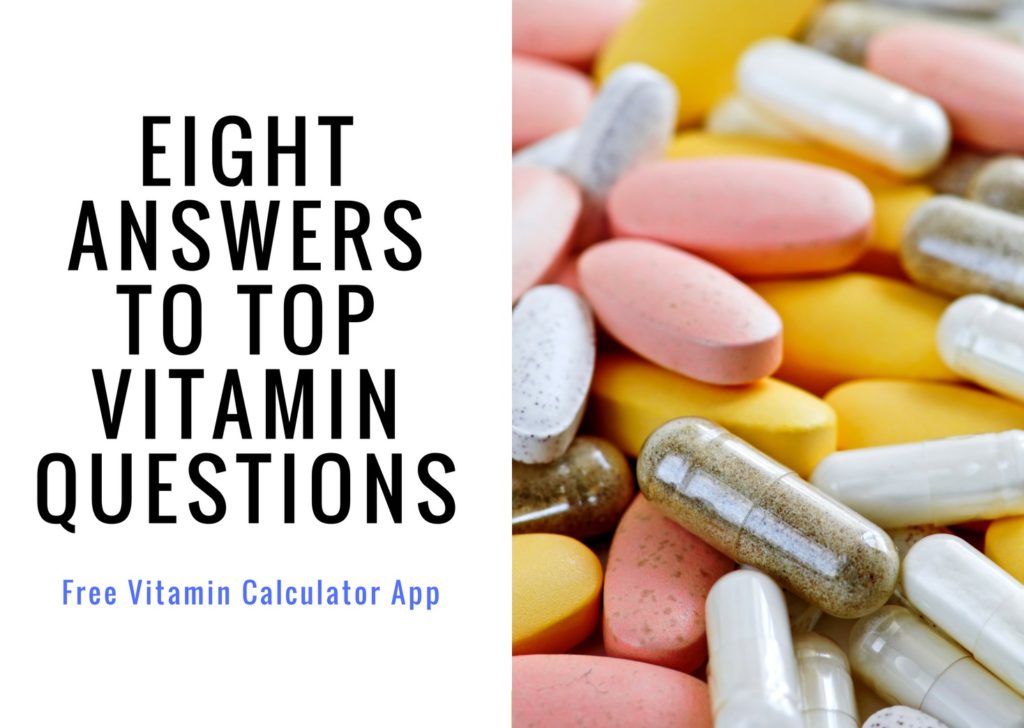8 Answers To Top Vitamin Questions
Summary: Answers to your top 8 questions about vitamin supplements, including multivitamins. A free online calculator provides you with vitamin recommendations tailored to your age and life stage. [Author: Brady Hartman. This article first appeared on the LongevityFacts.com website. Follow us on Reddit or Google+ ]
Answers to your top eight questions regarding vitamin supplements, based on research published by government agencies, leading health organizations, and leading medical journals.
In addition to answering your questions, you can calculate your tailored vitamin needs with a free vitamin calculator app at the end of this article.
About half of Americans take vitamin supplements daily, according to the National Health and Nutrition Examination Survey (NHANES). The survey reported that 40% of Americans take multivitamins. Other popular supplements include vitamin B, calcium, vitamin D, fish oil, Co-Q10, and vitamin C.
Answers to Vitamin Supplement Questions
Top 8 Questions
- How Much Do I Need?
- Can Extra Vitamin Supplements Ward Off Disease?
- Should Well-Nourished People Take Multivitamins?
- Can Vitamin Supplements Make Up for a Poor Diet?
- Who Needs To Take Vitamin Supplements?
- Which Vitamin Supplements Should I Avoid?
- How To Decide?
- What’s The Healthiest Option?
How Much Do I Need?
Vitamin and mineral requirements change, depending on sex and life stage, including infants, children, adults, pregnant women and older adults.
The Institute of Medicine (IOM) is a non-profit organization located in Washington, D.C., and part of the National Academy of Sciences. As an independent scientific organization, the IoM publishes nutrition recommendations called Dietary Reference Intakes (DRI). The DRIs are in turn used by large organizations, such as the USDA, when the make recommendations on vitamins and supplements.
Acronym Soup
They are a variety of terms including the acronyms DRI, RDA, DV (Daily Value), Recommended Intake and UL (Tolerable Upper Limit). The Institute of Medicine (IOM) determines RDA’s and UL’s. Both of these numbers vary by age, gender and whether a woman is pregnant or breastfeeding, creating different RDAs for each nutrient. Here is a short tutorial that hopefully ends the confusion:
RDAs – Recommended Daily Allowance. RDAs tell people of various age groups how much of that nutrient they should get on average. The IOM calculates the RDA as the daily dietary intake level of a nutrient considered sufficient by to meet the requirements of 97.5% of healthy individuals in each sex and stage of life. The online DRI calculator displays this value using the label “Recommended Intake per day.”
UL – Tolerable Upper Intake Levels – The highest level of daily nutrient consumption considered to be safe and cause no side effects in 97.5% of healthy individuals.
DRI – This a collective term used to refer to a set of recommendations, including RDA and UL values for each person. A useful analogy is that DRI is a deck of cards, and the RDA the ace of spades. Most people only care about the RDA, safely ignoring the term DRI.
Can Extra Vitamin Supplements Ward Off Disease?
Advice on vitamins and supplements is continually changing, with one research report contradicting the next. In 2013, a massive review of the evidence hopefully put an end to the controversy. The panel of physicians, led by Edgar Miller, M.D., a professor of medicine and epidemiology at Johns Hopkins University (JHU) reviewed a large body of evidence. The panel analyzed over 40 long-term clinical studies on vitamin supplements, research studies with a combined total of around 500,000 participants.
After reviewing the mounting evidence against multivitamins and vitamin supplements, the panel published their conclusions in the Annals of Internal Medicine (AIM), a top medical journal. In an editorial titled “Enough is Enough – Stop Wasting Money on Vitamin & Mineral Supplements,” with the physicians declaring that supplement usage was usually ineffective and sometimes harmful.
If you want to learn more about the AIM editorial, it has been discussed in a previous post on vitamin supplements. For those short on time, the following section summarizes the conclusions of the AIM study.
Findings of the AIM Editorial
- Studies of nearly half a million people showed that daily use of multivitamins and other vitamins and supplements didn’t improve the health of well-nourished people with healthy diets. Taking them didn’t reduce cancer, heart disease or death.
- When taken in excess, some vitamin supplements shortened lives.
- The authors purposely didn’t consider the benefits of vitamin supplementation for people with vitamin deficiencies or those at-risk of deficiencies.
Should Well-Nourished People Take Multivitamins?
Typical multivitamins provide too much vitamin A, iron, zinc, and niacin. In one study, investigators assessed the diets and multivitamin usage in a large group of people in Los Angeles and Hawaii. Before beginning the study, the researchers calculated vitamin and mineral intakes using a food questionnaire. The researchers discovered that about three-quarters of the participants already had adequate vitamin and mineral intakes from food alone, but many of them were still using multivitamins. The investigators found that some of the multivitamins users had excessive intakes of vitamins. About 10% to 15% consumed excessive vitamin A, iron, and zinc and over 50% consumed excessive niacin. The researchers concluded that multivitamin manufacturers should continue to ensure adequate levels of vitamin E, potassium, and calcium, however, they should alter their product formulas to lower the amounts of vitamin A, iron, niacin and zinc.
Both the USDA and Mayo Clinic recommend that people meet their nutritional needs from whole foods instead of vitamins and supplements. The USDA emphasizes this point on their website:
“nutritional needs should be met by eating a variety of foods as outlined in the Dietary Guidelines for Americans.”
Our bodies have evolved to rely on whole foods – such as whole grains, fruit, vegetables and unprocessed animal foods – for all of our nutritional needs. Processed foods are short on nutrients. Unprocessed whole foods deliver a complete set of nutrients to most people when consumed in balanced proportions.

Can Vitamin Supplements Make Up for a Poor Diet?
Vitamin Deficiency Rampant in the U.S.
The phrase vitamin deficiency is commonly associated with malnourished people in third world countries. Despite this stereotype, vitamin deficiencies are prevalent in the U.S.
Research on vitamin deficiency was published early in 2016 in the USDA’s 2015-2020 Dietary Guidelines for Americans. The research showed that most Americans are significantly deficient in many nutrients, especially the minerals potassium, magnesium, and calcium; dietary fiber; as well as vitamins, including vitamin A, choline and vitamins D, E, and C.
Some of the deficiencies are severe. The study concluded that practically no Americans consumed enough potassium and only 25% of Americans got enough Vitamin D, even when taking vitamin supplementation into account.
Vitamin Supplements Good For Some, Not For All
The National Center for Complementary and Integrative Health (NCCIH) is a division of the U.S. Department of Health & Human Services, National Institutes of Health (NIH). Regarding the use of supplements, the NCCIH recommends:
“…some people who don’t get enough vitamins and minerals from food alone, or who have certain medical conditions or problems, might benefit from taking one or more of these nutrients found in single-nutrient supplements [vitamin supplements] or in MVMs [multivitamins / multi-minerals]. However, evidence to support their use for overall health or disease prevention in the general population remains limited.” [emphasis mine]
Filling In The Gaps With Vitamin Supplements
The USDA also agrees with the NCCIH, stating on their website that vitamins and supplements may sometimes be used to fill in the gaps:
“In some cases, fortified foods [such as vitamin fortified cereals] and dietary supplements [vitamin supplements] may be useful in providing one or more nutrients that otherwise may be consumed in less than recommended amounts.”
Who Needs To Take Vitamin Supplements?
Various organizations recommend vitamin supplements for particular groups of people. Five government agencies publish advice, including, the FDA, USDA, the NIH’s Office of Dietary Supplements (ODS), NCCIH and the IOM as well.
Special Groups Include
- Childbearing women and adolescent females.
- Women who might become pregnant.
- Breastfed and partially breastfed infants.
- Post-menopausal women.
- Males and females over 50.
- People with multiple food allergies.
- Vegans and some vegetarians (vitamin B-12 comes from animal foods).
- People on low-calorie diets (due to substance abuse, poor appetite, eating disorder or intentional fasting).
- People with various medical conditions that affect vitamin status.
Vitamin Supplements For Special Groups
If you are a member of one of the particular groups, here are links to resources that you can use to determine your needs.
- The USDA provides particular recommendations for several groups of people, including adults over age 50.
- The NCCIH has a separate list of particular groups who may consider vitamin supplements, also include adults over 50 years old.
Calcium Deficiency Of Special Concern
The NIH’s Office of Dietary Supplements (ODS), writes that calcium is deficient in many Americans, noting: “many people don’t get recommended amounts [RDA] of calcium from the foods they eat,” especially boys from 9 to 13 years of age, girls from 9 to 18 years of age, post-menopausal women and women older than 50 years old, and men older than 70 years. ODS also states that other groups susceptible to calcium deficiencies include women whose menstrual periods stop while still in their childbearing years; people with lactose intolerance; and various vegetarians who avoid calcium-rich dairy products.

Which Vitamin Supplements Should I Avoid?
It’s not jumultivitaminsins that are getting a bad rap. A recent study provides strong evidence that certain antioxidant vitamins and supplements are detrimental to the health in supranormal doses. Using this and other research, LongevityFacts.com has identified four vitamins and one mineral shown to be harmful to health when consumed in the high doses. Here is a link to an article listing the top 5 deadly vitamins and minerals.

Vitamin Supplements – How To Decide?
The United States Preventive Services Task Force (USPSTF) is an independent panel of experts who systematically review scientific evidence and then publish their recommendations. The task force is staffed by physicians and epidemiologists that focus exclusively on preventing rather than treating diseases.
According to the USPSTF, getting the best health care involves making smart decisions that consider the following four factors: 1) Consider your health and lifestyle. 2) Understand your personal beliefs and preferences for health care. 3) Review scientific recommendations (from reputable sources), and finally armed in this manner, 4) Discuss the evidence and decide with a licensed physician.

What’s The Healthiest Option?
The USDA urges caution for people who already have a healthy diet, advising:
“If you are already eating the recommended amount of a nutrient, you may not get any further health benefit from taking a [vitamin or mineral] supplement,” adding: “In some cases, supplements and fortified foods may actually cause you to exceed safe levels of intake of nutrients.”
Vitamins and supplements can never replace the benefits of a diet rich in whole foods, including fruits and vegetables, and whole grains. According to the USDA 2015-2020 Dietary Guidelines:
“Nutritional needs should be met primarily from foods, ” adding: “Individuals should aim to meet their nutrient needs through healthy eating patterns that include nutrient dense foods.” Concluding: “Foods in nutrient dense forms contain essential vitamins and minerals and also dietary fiber and other naturally occurring substances.” [emphasis mine]

Instead of trying to fix a poor diet with vitamins and supplements, it’s preferable and healthier to eat a well-balanced diet rich in nutritious food.
The key to a long life is a diet rich in fruits and vegetables. Plant-based foods are a far healthier source of vitamins and minerals. Plants contain other nutrients which help to prevent cancer, stroke and heart disease and reduce the risk of death by 31%. A related article shows you how to add more fruits and vegetables to your day.
Whole foods aren’t just a healthier source of vitamins and minerals, but of other nutrients as well. For example, studies have found that whole fish is healthier than fish oil supplements. Read all about it in this related article: The Dirty Secret of Omega-3 Fish Oil Supplements.
Free Online Vitamin Needs App
Vitamin and mineral needs vary, depending on age and life stage. You can determine personalized dietary needs using the online DRI calculator, based on IOM’s data, provided free of charge by the U.S. Department of Agriculture (USDA).
Take Home Message
- An expert panel analyzed more than 40 research studies, covering nearly half a million people. They concluded that vitamin supplements, including multivitamins, aren’t helpful for the well-nourished American. Substantial evidence is lacking to support the claims that multivitamin and other vitamin supplements prevent heart attack, cancer, and premature death in the general population.
- Some vitamin and mineral supplements are harmful when taken in supranormal doses.
- Vitamins and mineral supplements, while helpful to people with deficiencies are a waste of money for most.
- Vitamin and mineral supplements are most useful for people with deficiencies, certain older adults, and people with specific medical conditions.
- The decision to take supplements should be based on one’s health and lifestyle, personal beliefs, and preferences as well as scientific recommendations.
- A supplementation regimen should be under the direction and guidance of a physician.
Help Us Spread the Word
Please help us spread the word. To share this article it only takes one simple click on the Facebook link.
Disclaimer
1) Advice, Diagnosis and or Treatment: This article is intended for to inform and educate the public about the keys to a long life, and is not a substitute for professional medical advice, nor for the diagnosis or treatment of any medical condition. Do not start or stop a vitamin or mineral supplement regimen based on anything you have read in this article. Call 911 or the emergency hotline for any medical emergency. Consult a licensed physician with any questions you may have regarding vitamin supplements or a medical condition. As well, refer to a doctor before significantly changing your diet, starting or stopping a supplement regimen or an exercise program. 2) External Links & Photos: This article is not intended to endorse organizations, companies or their products. Links to external websites, mention or depiction of specific organizations, companies or brands are intended for illustration only and does not constitute an endorsement.

Fix the gap .. also .. You need to fix some of the pics .. nice article .. well written
thanks for posting this